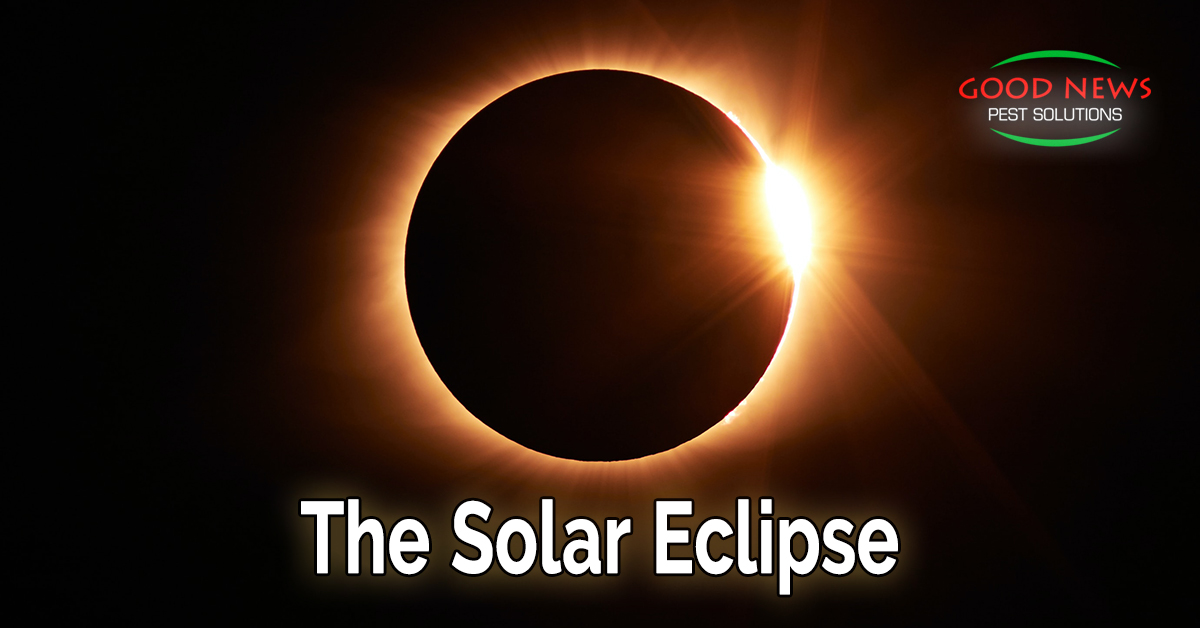
The Solar Eclipse
While we were preparing for bed last night, Wednesday, April 19, 2023, something unusual happened. Our global neighbors in Australia, Eastern Europe, the Middle East, Africa and Asia – where it was already Thursday morning, the 20th – experienced a rare hybrid solar eclipse.
There are actually four different types of eclipses. Technically, any time even a tiny bit of the moon comes between the earth and the sun it counts as a partial solar eclipse. If the moon covers almost all of the sun – leaving the burning corona visible just outside the moon’s dimensions – it’s called an annular eclipse. That’s the popular image in science fiction movies and what we show in our graphic today.
A total eclipse is just what it sounds like. The moon is at the right angle that, even though it’s 400 times smaller than the sun, is close enough that it masks the sun entirely. The rarest eclipse is what happened just hours ago. Because of the rotation of the earth and the orbit of the moon, the eclipse is partial, then annular, then total, before it becomes a partial eclipse again. Only seven hybrid eclipses have or will have happened this century. Set your calendars – the next hybrid solar eclipse will be in November of 2031, and be visible in the United States.
Scientists estimate only about 375,000 people in Western Australia saw the total eclipse (for about 2 minutes).
Effects and Affects
While we no longer look to the sky and wonder why the gods are taking away the sun, solar eclipses still have a psychological effect on humans. Then there are physiological changes for animals and plants.
For outdoor animals and plants, it’s mostly the alteration in temperature that causes changes. It’s more obvious and extreme in other areas, but even here on the Gulf Coast of Florida, there is a shift when the sun goes down. The same shift happens when the sun is blocked by the moon.
The cooler temps send barnyard and woodland animals into their nighttime habits (which probably really confuses them when the sun comes back a few moments later). Birds and insects will get louder and louder as the sun gets smaller – then suddenly silent as the eclipse hits totality. There’s nothing creepier than the sun completely disappearing along with every other sound in the wild.
Pets react to an eclipse similarly to the way they do with fireworks or an earthquake. They know something isn’t quite right and may be confused by the darkness without their owners acting like it’s nighttime. They can also pick up on our reaction to the strangeness of the situation.
For humans, anxiety can increase as the eclipse encompasses more and more of the sun – but the moment it starts reappearing causes us to be more interested in loving and connecting with others.
Emerging From the Darkness
Scientists have started studying more of the effects of eclipses on birds and insects. A team of researchers with Oxford and Cornell Universities studied patterns during the total solar eclipse we had in 2017.
They wanted to see how they would react. With shorter lifespans, most of the creatures they tracked would have no memory of a similar event. Most of the subjects studied – via weather stations and doppler patterns – acted prior to the totality in the same way they’d react before a storm.
That could mean they have some genetic coding passed down that alerts them subconsciously. It also implies they sense change in a way that’s outside of our perception.
One group of birds in particular appeared to suddenly take flight and then quickly settle back to their perches once again, seconds before the total eclipse happened. Researchers haven’t drawn any concrete conclusions, but hope to continue their study in the coming months.
Another fun fact – eclipses come in pairs (sometimes trios). About two weeks after a solar eclipse it is followed by a lunar eclipse. So look for that on May 5th.
While the mythical gods may no longer be governing their realms and controlling the seasons, you can certainly take control of your realm. If you’ve started your spring cleaning, why not close it out with the best pest solutions in Florida.
Start with our Go Green Perimeter Plus that covers the usual creepy crawly suspects. Then consider adding on Term Assure 365, TAP Insulation or our popular Mosquito Protection Program. For the complete details on any of these programs, give us a call today!
Proudly Serving
Sun City Center, Ruskin, Palmetto, Parrish, Ellenton, Bradenton, Anna Maria, Holmes Beach, Bradenton Beach, Longboat Key, Lakewood Ranch, University Park, Myakka City, Sarasota, Siesta Key, Osprey, Nokomis, Casey Key, Venice, Englewood, North Port, Port Charlotte, Punta Gorda, Arcadia
Things You Can Do
Pay Your Bill Online
Leave Us a Review
Request a Free* Termite Inspection
Stop Mosquito Bites
Get Rid of Rodents
Get a Termite Damage Warranty
Get Pest Control for Your Attic
Get Pest Control for Your Business Request Prayer
Corporate Address
1080 Enterprise Court, Ste A
North Venice, FL 34275
Call Now: (941) 412-9610
Text: (941) 412-9610
Fax: (941) 412-0080
